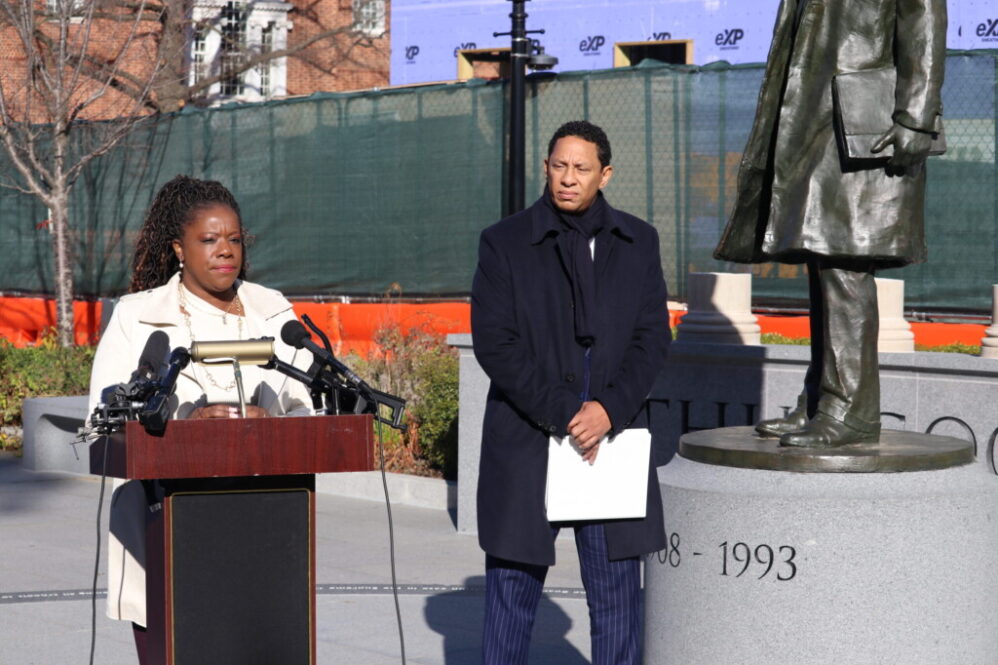MARYLAND MATTERS: Aisha Braveboy and Ivan Bates, Democratic prosecutors who represent two of Maryland’s largest jurisdictions, held a joint press conference Thursday in Annapolis to unveil legislative priorities for the upcoming General Assembly session.
Braveboy, state’s attorney for Prince George’s County, and Bates, state’s attorney for Baltimore, summarized those at Lawyers’ Mall and in a glossy pamphlet: public safety enhancements, juvenile justice reform, criminal justice reform and restorative justice reform and community resources.
Both prosecutors said they want people who are charged with serious crimes to receive tough but fair sentences. They also want to provide those who are incarcerated with resources to be rehabilitated and to become productive citizens when they are released.
“But it all starts with accountability,” said Braveboy, a former state delegate who represented the county’s 25th legislative district. “We believe that there is an appetite here in Annapolis for change.”
One of the main topics in Maryland has been juvenile justice, with some prosecutors, lawmakers and law enforcement officials saying that Juvenile Justice Reform and other measures passed by lawmakers last year haven’t helped reduce crime.
The state Department of Juvenile Services (DJS) report from September shows non-fatal shootings for youth ages 18 and younger increased from 41 in 2013 to 171 in 2022. During that time, homicides escalated from 29 in 2013 to 47 in 2022.
One juvenile reform proposed by the two state’s attorneys Thursday would extend the probationary period. A pamphlet they distributed Thursday morning said they wanted to extend the probationary period from six months to 18 months for juveniles guilty of a firearm misdemeanor. Thursday evening they issued a press release stating they advocate extending that probationary period to two years. For juveniles found guilty of committing a violent felony, probation would be lengthened from two years to a maximum of four years.
The state’s attorneys said this would give juveniles additional time to complete any rehabilitation programs.
In a memo last month, Sen. Ron Watson (D-Prince George’s) said he plans to sponsor a juvenile justice reform bill that would also extend probationary periods. Instead of six months on probation for a juvenile guilty of a firearm misdemeanor, Watson proposes extending probation to two years. For a juvenile found guilty of a felony or a crime involving a firearm, Watson proposes extending probation to a period of up to five years.
Braveboy and Bates are proposing a tweak to the Child Interrogation Protection Act passed last year. The act allows juveniles who are taken into custody, interrogated, or charged with a criminal offense to consult with a lawyer in-person or by phone. Braveboy and Bates want to eliminate the phone option and allow that consultation to take place “solely” in person.
Watson proposes amending the law to allow a parent to waive the requirement that a child must first speak to an attorney before talking with law enforcement. His proposal also would permit a child to decline speaking with a law enforcement representative and to speak with a lawyer instead.
But Sen. Jill Carter (D-Baltimore), who sponsored the reform bills, said last week at the Maryland Association of Counties winter conference that everyone involved, including juveniles, needs to understand the law, and that children who are arrested need to understand their rights.
Meanwhile, the state’s attorneys are supporting a measure that Del. Nicole Williams (D-Prince George’s) plans to reintroduce next year. It would allow state’s attorneys to file a motion in court “at any time” to modify the sentence of a person who is incarcerated.
Under current law, Braveboy said, this must be done within the first five years of a person’s sentence.
Another request from the state’s attorneys is streamlining the process for families to receive money for funeral expenses of loved ones who are victims of crime. The fund is administered by the Criminal Injuries Compensation Board, but Braveboy said it could take families up to a year or longer to get paid.
A few other proposed legislative priorities highlighted Thursday include creating a registry of those convicted of domestic violence and a $500,000 budget request to fund the Prince George’s County State’s Attorney’s Office’s Emerging Adult Program which helps those ages 18 to 26, who are currently incarcerated or on parole or probation, to participate in counseling, job training and other programs.
“We feel that we have a legislative package that is fair,” Bates said. “We ask the legislature to really listen to the community, so we can all work together to have a safer state [and] to make our communities safer.”
The 90-day legislative session in Annapolis begins Jan. 10.











